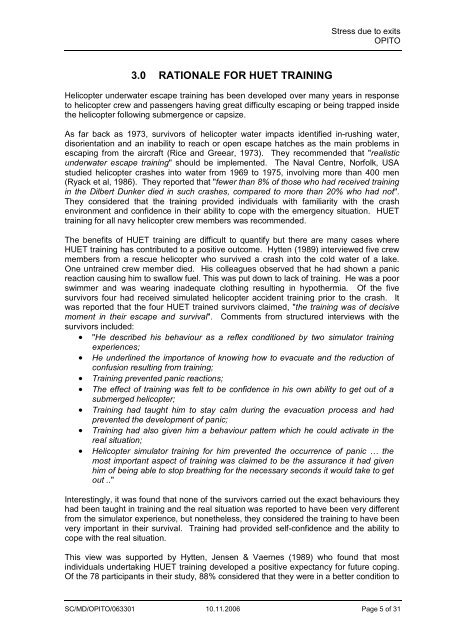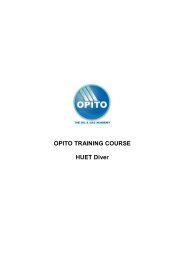Stress levels associated with huet - Opito
Stress levels associated with huet - Opito
Stress levels associated with huet - Opito
You also want an ePaper? Increase the reach of your titles
YUMPU automatically turns print PDFs into web optimized ePapers that Google loves.
3.0 RATIONALE FOR HUET TRAINING<br />
<strong>Stress</strong> due to exits<br />
OPITO<br />
Helicopter underwater escape training has been developed over many years in response<br />
to helicopter crew and passengers having great difficulty escaping or being trapped inside<br />
the helicopter following submergence or capsize.<br />
As far back as 1973, survivors of helicopter water impacts identified in-rushing water,<br />
disorientation and an inability to reach or open escape hatches as the main problems in<br />
escaping from the aircraft (Rice and Greear, 1973). They recommended that "realistic<br />
underwater escape training" should be implemented. The Naval Centre, Norfolk, USA<br />
studied helicopter crashes into water from 1969 to 1975, involving more than 400 men<br />
(Ryack et al, 1986). They reported that "fewer than 8% of those who had received training<br />
in the Dilbert Dunker died in such crashes, compared to more than 20% who had not".<br />
They considered that the training provided individuals <strong>with</strong> familiarity <strong>with</strong> the crash<br />
environment and confidence in their ability to cope <strong>with</strong> the emergency situation. HUET<br />
training for all navy helicopter crew members was recommended.<br />
The benefits of HUET training are difficult to quantify but there are many cases where<br />
HUET training has contributed to a positive outcome. Hytten (1989) interviewed five crew<br />
members from a rescue helicopter who survived a crash into the cold water of a lake.<br />
One untrained crew member died. His colleagues observed that he had shown a panic<br />
reaction causing him to swallow fuel. This was put down to lack of training. He was a poor<br />
swimmer and was wearing inadequate clothing resulting in hypothermia. Of the five<br />
survivors four had received simulated helicopter accident training prior to the crash. It<br />
was reported that the four HUET trained survivors claimed, "the training was of decisive<br />
moment in their escape and survival". Comments from structured interviews <strong>with</strong> the<br />
survivors included:<br />
• "He described his behaviour as a reflex conditioned by two simulator training<br />
experiences;<br />
• He underlined the importance of knowing how to evacuate and the reduction of<br />
confusion resulting from training;<br />
• Training prevented panic reactions;<br />
• The effect of training was felt to be confidence in his own ability to get out of a<br />
submerged helicopter;<br />
• Training had taught him to stay calm during the evacuation process and had<br />
prevented the development of panic;<br />
• Training had also given him a behaviour pattern which he could activate in the<br />
real situation;<br />
• Helicopter simulator training for him prevented the occurrence of panic … the<br />
most important aspect of training was claimed to be the assurance it had given<br />
him of being able to stop breathing for the necessary seconds it would take to get<br />
out .."<br />
Interestingly, it was found that none of the survivors carried out the exact behaviours they<br />
had been taught in training and the real situation was reported to have been very different<br />
from the simulator experience, but nonetheless, they considered the training to have been<br />
very important in their survival. Training had provided self-confidence and the ability to<br />
cope <strong>with</strong> the real situation.<br />
This view was supported by Hytten, Jensen & Vaernes (1989) who found that most<br />
individuals undertaking HUET training developed a positive expectancy for future coping.<br />
Of the 78 participants in their study, 88% considered that they were in a better condition to<br />
SC/MD/OPITO/063301 10.11.2006 Page 5 of 31




